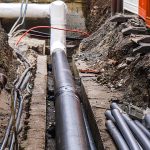The Do's and Don'ts of Liquid Waste Disposal
Proper liquid waste disposal is crucial for maintaining a healthy environment and preventing damage to your plumbing system, and understanding what can and cannot be poured down the drain is essential to avoid costly repairs and environmental harm. This article will explore the do’s and don’ts of liquid waste disposal, providing practical tips for responsible waste management.
The Impact of Improper Liquid Waste Disposal
Improper liquid waste disposal can have significant consequences for both individual households and the environment. When harmful substances are poured down the drain, they can:
- Clog Pipes: Substances like grease, oil, and food particles can solidify and clog pipes, leading to plumbing issues and potential overflows.
- Damage Septic Systems: Septic tanks rely on bacteria to break down organic waste, and discarded chemicals and other pollutants can disrupt this delicate balance, reducing the system’s effectiveness and leading to costly repairs.
- Pollute Water Sources: When improperly disposed of, pollutants can seep into groundwater and surface water, contaminating drinking water supplies and harming aquatic ecosystems.
The Do’s of Liquid Waste Disposal
- Water: Water is the only substance that should be routinely poured down the drain, sink, toiler, or other.
- Toilet Paper: Modern, dissolvable toilet paper is designed to break down in sewerage systems.
- Greywater: Greywater, which includes wastewater from sinks, showers, and washing machines, can generally be safely discharged into the sewer system or a septic tank. However, it’s important to avoid pouring excessive amounts of grease, oil, and food particles down the drain.
The Don’ts of Liquid Waste Disposal
- Flushing Non-Biodegradable Items: Avoid flushing items like wipes, paper towels, feminine hygiene products, and cotton balls down the toilet. These items can clog pipes and damage systems.
- Pouring Chemicals and Solvents: Chemicals, solvents, and paint thinners can harm the environment and damage plumbing systems. Dispose of these substances properly at designated hazardous waste disposal facilities or contact us for more information.
- Pouring Grease and Oil: Grease and oil can solidify in pipes, causing clogs. Wipe up excess grease with paper towels and dispose of the towels in the bin.
- Pouring Food Waste: Food waste can attract pests and contribute to clogs. It’s better to dispose of food scraps in the compost or garbage bin.
The Role of Septic Tanks in Liquid Waste Disposal
Some Australian homes, especially those in rural and semi-rural areas, rely on septic tank systems for wastewater treatment. Septic tanks are underground tanks that separate wastewater into solids and liquids. The solid waste settles at the bottom of the tank, while the liquid waste flows into a drain field for further treatment by soil bacteria.
To ensure optimal performance of septic tanks, it’s crucial to avoid pouring harmful substances down the drain at the home. Chemicals, solvents, and excessive amounts of grease and oil can damage the beneficial bacteria in the septic tank, leading to system failure.
The Environmental Impact of Improper Liquid Waste Disposal
Improper liquid waste disposal can have a significant impact on the environment. When harmful substances enter waterways, they can:
- Contaminate Drinking Water: Polluted water sources can pose serious health risks to humans and animals.
- Harm Aquatic Life: Pollutants can harm fish, plants, and other aquatic organisms.
- Disrupt Ecosystems: Chemical pollutants can disrupt the delicate balance of ecosystems, leading to long-term environmental damage.
Tips for Responsible Liquid Waste Disposal
- Use Drain Strainers: Drain strainers can help catch food particles and other debris, preventing them from entering the pipes.
- Regularly Clean Drains: Periodically clean drains with hot water and baking soda to remove buildup.
- Choose Eco-Friendly Cleaning Products: Opt for environmentally friendly cleaning products that are less harmful to the environment.
- Fix Leaks Promptly: Repair leaky faucets and pipes to conserve water and prevent unnecessary waste.
- Be Mindful of Water Usage: Reduce water consumption by taking shorter showers, fixing leaks, and using water-efficient appliances.
- Regular Septic Tank Maintenance: If you are the owner of a septic tank, schedule regular inspections and pumping to ensure optimal performance.
- Educate Your Household: Educate all household members about proper liquid waste disposal practices.
Additional Tips for Homeowners
- Winterising Your System: If you own a home located in a colder climate, consider winterising your system to prevent freezing and damage. Consult with a professional to ensure proper winterisation procedures.
- Minimising Water Usage: During periods of non-occupancy, minimise water usage to reduce the load on your system. Consider turning off the water supply to the house or installing a water shut-off valve.
In Conclusion
By following these guidelines, you can help protect the environment and maintain a healthy plumbing system. Responsible liquid waste disposal is a small step that can have a significant impact on the planet, so let’s all do our part to keep our water clean and our communities thriving. If you require liquid waste disposal please contact us on +61 2 6645 3100 or send us a message here.


